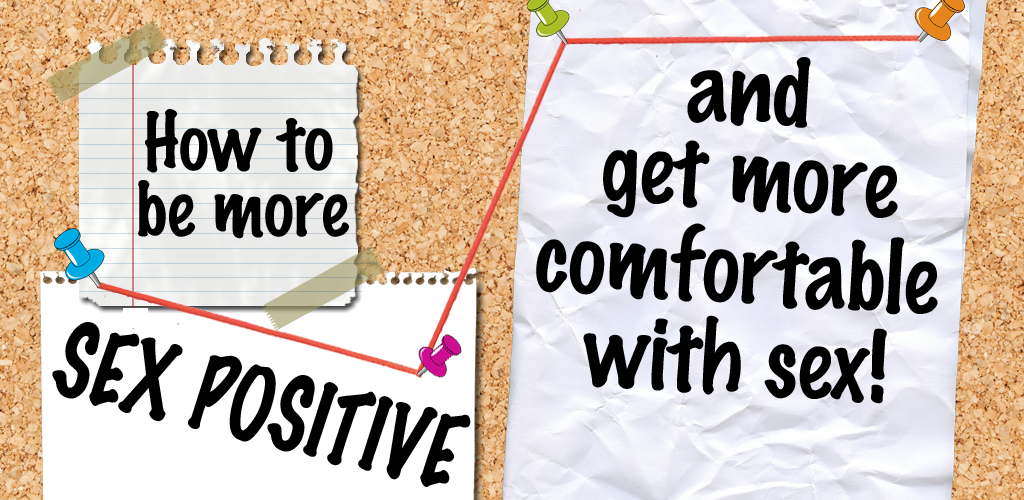

Good questions! First up, let’s get on the same page for what it means to be “sex-positive.” srhweek.ca has a pretty great definition of sex positivity that goes like this:
Sex positivity embraces sexuality with the view that the only relevant concerns when it comes to a sexual act, practice or experience are the consent, pleasure and well-being of the people engaged in it or the people affected by it. Sex positivity places no moral value on different sexualities or sex acts. It helps us set aside our judgments and make room for the diversity of human sexuality.
So in response to the above question, setting aside your judgements about the consensual sex that other people have doesn’t mean that you have to do it too. Sex-positive doesn’t mean that you have to go out and have lots of sex. You can be sex-positive and still think that sex is kinda gross. Sex-positive just means that you’re cool with other people doing their thing. That’s being sex-positive.
But it’s true that unlearning sex-negativity can be hard. There are tons of reasons why people are uncomfortable talking about sex, and it can be tough to overcome them. A lot of us grow up where sex conversations are very serious/medical talks from grown-ups in our lives, or maybe just total joke conversations with friends. There’s not a lot of room in spaces like that for sincere conversations where you talk about your own sexual wants and needs.
So, if you’re interested, how do you work at developing more sex-positivity for yourself? It can be helpful to think about sex-positivity as a process. It’s not a new way of being that you get to in 5 easy steps, but a mindset that you are always working on bringing to new situations and interactions as you go through your life. Here are 5 strategies to consider if you are looking to develop a headspace for being more sex-positive:
A lot of what makes us uncomfortable is the unknown. But the more you know about sex, sexuality and gender, the more familiar it will all start to seem to you. Reading, watching videos, listening to podcasts, or even having more conversations about sex and sexuality with friends is also a good way to draw parallels to experiences or feelings you’ve had in your own life (thereby making sex more relatable and less strange or scary).
A lot of porn and media is very aggressive towards people who don’t fit the stereotypical straight/cis/white/fit/male bodied person. Watching alternative or feminist porn can expose you to different types of sex and intimacy. And seeking out movies or books or shows outside of the mainstream media can also broaden your understanding of other people’s experiences, and possibly help you develop a more open and non-judgemental mindset.
Like we said above, being sex-positive doesn’t mean you have to have a ton of sex or do all of the things that your partners do. For example, some people are into kink and some people aren’t. It’s totally okay if you’re not, as long as you are open and supportive of other people being kinky.This doesn’t mean you’re not sex-positive, or that your sex life is less than that of other people. Accepting your desires and your boundaries as yours is a step towards understanding and accepting the desires and boundaries of others.
Another good way to work on being sex-positive is not just thinking about it, but also acting on it. Calling out when people slut-shame, assume people’s sexual orientations or genders, or make fun of people for being virgins or not having sex are good, active things to do to practice being sex-positive. And if you notice that you’re doing any of these behaviours (either to yourself or to others), take a second to pause, and recommit yourself to being actively and outwardly sex-positive.
Sometimes we can be awkward about sex because we don’t spend enough time thinking about it. Some people’s gut reactions to new things is “No thanks!” But if we can take a few minutes to think about different aspects of sex, we can better understand what and how we feels about it. Again, you might still feel “No thanks!” about sex stuff, but being sex positive is being open to understanding and respecting other people’s choices to do it.
And yeah, as we said above, it’s totally fine if you find sex kinda gross. It’s very bodily, often involves fluids, etc. Gross stuff. But there are things you can do if you want to get more comfortable with sex acts and having sex with someone else. Here are some suggestions:
We mentioned above how lots of our sex conversations are either totally serious or 100% jokes, and that can make it hard to feel comfortable talking about it with partners. It can also be hard to clearly communicate what you feel in the moment that sex stuff is happening. Try to have conversations with your partner about what you do or don’t like about sex in low-key situations, maybe over dinner or during a walk in a park. This can help take out some of the tension that can come up for people.
Thinking about sex is one thing, but actually trying sexy stuff can go a long way in helping you feel more comfortable. Trying it by yourself also lets you focus on what you want. Worry about partner stuff later! Masturbating is a good way to learn what feels good for your body. Wearing clothes that make you feel sexy can help you become more comfortable with the idea of you/your body being sexy. If you’re 18+, watching porn can help you see what different types of sex or partners could be like (please be mindful to seek out feminist/alternative porn, though).
If you do start exploring partnered sex, go slow. There’s no rush. Stick with what you’re comfortable with, and then explore from there. There’s no timeline for when or even if partners go from making out to masturbating to oral sex to penetrative sex, etc. These are all different activities that you can engage with depending on how you’re feeling and what you’re interested in. If your partner tries to rush you to do things that you’re not comfortable with, then they’re a bad sex partner for you.
Again, you don’t need to be into everything. Talking with your partner ahead of time (maybe even during one of the low-key conversations we suggested before) about what you are and are not interested in can alleviate some of the stress that comes with worrying what they’re going to ask you to do in the moment. Boundaries help give structure, which can help make sex seem less all-over-the-place or overwhelming. It can also help to set priorities about what is important for you in any given sexual activity. Do you both want/need to orgasm? Do you want to try something you haven’t tried before? Do you just want to work up a sweat? These things can also help keep the sex you have in the realm of what you want and are comfortable with.
In the same way that people set boundaries or prioritize in order to get what they want out of sex, being ready for things to not be amazing is also a good idea. Talking to your partner about what you’ll do if you realize you don’t have birth control/condoms, if someone loses an erection, if one partner is in the mood but the other isn’t, etc. Considering and planning for how you’ll react and deal with surprises or road bumps is a good way to take some of the anxiety out of worrying “What if something goes wrong?” during sex.
These are just some suggestions of ways you can work on being more sex-positive and comfortable with sex. Again, it’s totally fine if you forever think that sex is not for you. You don’t have to want to do any kind of sexual activity. But being sex-positive means being open and judgement free about the consensual sex that other people have.
For more info on Sex Positivity, check out What is Sex Positivity from srhweek.ca [Link].
For more of our info pages on sex and relationships, consider reading:
If you have questions about this topic, feel free to contact one of our peer educators. [Link]
Last Updated: April 2020

Please note that the number we use for texting has now changed. Any text messages sent to our old number will not be read or received. We can be now reached by text at 647-905-6455. Currently we are only able to receive text messages during the times that our lines are open which are: Monday to […]

We like to use the term Sexually Transmitted Infection (STI) here at Teen Health Source, not Sexually Transmitted Disease (STD). Did you notice? Do you ever wonder why? Well, we’re happy to tell you!

Whether it’s a broken condom or surprise roommates coming home, what are people supposed to do when sex doesn’t end up happening? We’ve come up with a few suggestions of fun alternatives! Check them out!